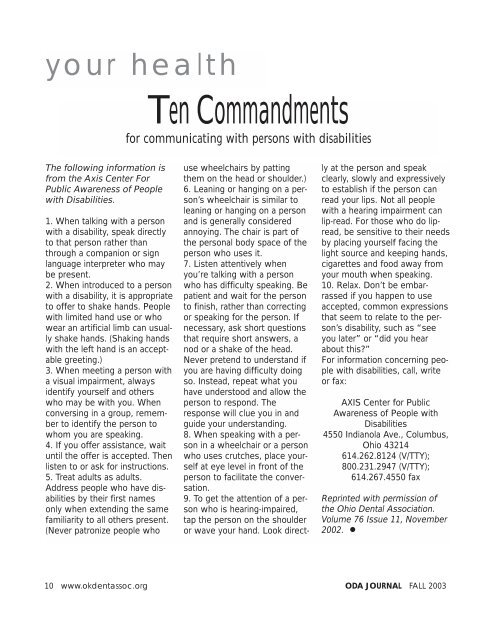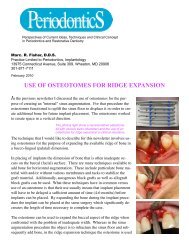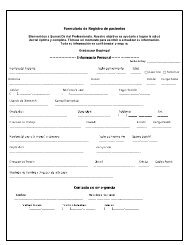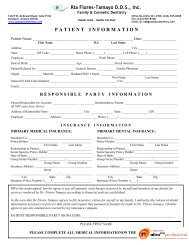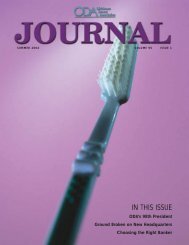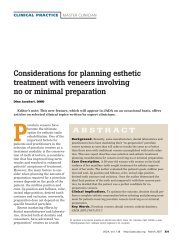FALL 2003 VOLUME 94 ISSUE 2 - Website
FALL 2003 VOLUME 94 ISSUE 2 - Website
FALL 2003 VOLUME 94 ISSUE 2 - Website
You also want an ePaper? Increase the reach of your titles
YUMPU automatically turns print PDFs into web optimized ePapers that Google loves.
your health<br />
The following information is<br />
from the Axis Center For<br />
Public Awareness of People<br />
with Disabilities.<br />
1. When talking with a person<br />
with a disability, speak directly<br />
to that person rather than<br />
through a companion or sign<br />
language interpreter who may<br />
be present.<br />
2. When introduced to a person<br />
with a disability, it is appropriate<br />
to offer to shake hands. People<br />
with limited hand use or who<br />
wear an artificial limb can usually<br />
shake hands. (Shaking hands<br />
with the left hand is an acceptable<br />
greeting.)<br />
3. When meeting a person with<br />
a visual impairment, always<br />
identify yourself and others<br />
who may be with you. When<br />
conversing in a group, remember<br />
to identify the person to<br />
whom you are speaking.<br />
4. If you offer assistance, wait<br />
until the offer is accepted. Then<br />
listen to or ask for instructions.<br />
5. Treat adults as adults.<br />
Address people who have disabilities<br />
by their first names<br />
only when extending the same<br />
familiarity to all others present.<br />
(Never patronize people who<br />
Ten Commandments<br />
for communicating with persons with disabilities<br />
use wheelchairs by patting<br />
them on the head or shoulder.)<br />
6. Leaning or hanging on a person’s<br />
wheelchair is similar to<br />
leaning or hanging on a person<br />
and is generally considered<br />
annoying. The chair is part of<br />
the personal body space of the<br />
person who uses it.<br />
7. Listen attentively when<br />
you’re talking with a person<br />
who has difficulty speaking. Be<br />
patient and wait for the person<br />
to finish, rather than correcting<br />
or speaking for the person. If<br />
necessary, ask short questions<br />
that require short answers, a<br />
nod or a shake of the head.<br />
Never pretend to understand if<br />
you are having difficulty doing<br />
so. Instead, repeat what you<br />
have understood and allow the<br />
person to respond. The<br />
response will clue you in and<br />
guide your understanding.<br />
8. When speaking with a person<br />
in a wheelchair or a person<br />
who uses crutches, place yourself<br />
at eye level in front of the<br />
person to facilitate the conversation.<br />
9. To get the attention of a person<br />
who is hearing-impaired,<br />
tap the person on the shoulder<br />
or wave your hand. Look direct-<br />
ly at the person and speak<br />
clearly, slowly and expressively<br />
to establish if the person can<br />
read your lips. Not all people<br />
with a hearing impairment can<br />
lip-read. For those who do lipread,<br />
be sensitive to their needs<br />
by placing yourself facing the<br />
light source and keeping hands,<br />
cigarettes and food away from<br />
your mouth when speaking.<br />
10. Relax. Don’t be embarrassed<br />
if you happen to use<br />
accepted, common expressions<br />
that seem to relate to the person’s<br />
disability, such as “see<br />
you later” or “did you hear<br />
about this?”<br />
For information concerning people<br />
with disabilities, call, write<br />
or fax:<br />
AXIS Center for Public<br />
Awareness of People with<br />
Disabilities<br />
4550 Indianola Ave., Columbus,<br />
Ohio 43214<br />
614.262.8124 (V/TTY);<br />
800.231.2<strong>94</strong>7 (V/TTY);<br />
614.267.4550 fax<br />
Reprinted with permission of<br />
the Ohio Dental Association.<br />
Volume 76 Issue 11, November<br />
2002. •<br />
10 www.okdentassoc.org ODA JOURNAL <strong>FALL</strong> <strong>2003</strong>


